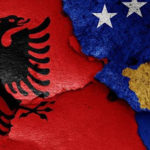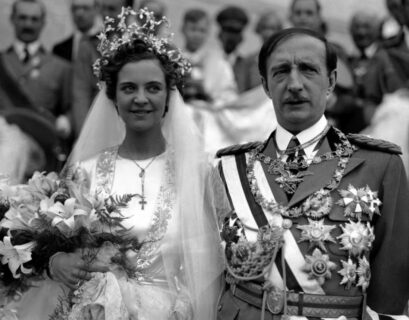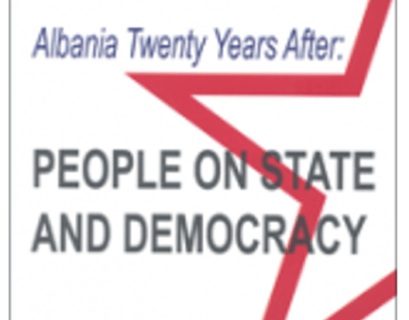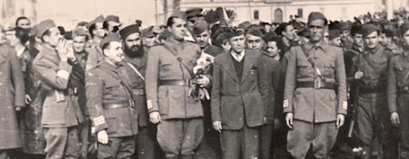Bernd J. Fischer
The generally accepted narrative concerning Albania’s early parliamentary development has it that while the leaders responsible may have been well-intentioned, they achieved little in the way of concrete accomplishments, which allowed Albania, by the middle of the 1920s, to slip into authoritarian rule leaving no room for a functioning parliament. While there may be some basis to support this scenario – certainly Albania’s road to parliamentary democracy was less than smooth – early parliamentary development in Albania can only be understood in the context of contemporary conditions. It might be useful, therefore, to begin a discussion of early parliamentary development with a description of the contemporary scene in Albania at the time of independence and in the years immediately thereafter.
When a group of intellectuals, tribal leaders, and former Ottoman officials proclaimed the independence of Albania in November 1912, they were motivated in part by fear. They were afraid that unless Albania established some separate political identity immediately, Albanian-inhabited lands would be divided among the participants of the first Balkan war. They were afraid, too, that in 1912 Albania was little more than a geographic expression with few of the prerequisites for the establishment of a unified European nation-state. Many of the necessary pre-conditions generally associated with unity were lacking. There was no centralization of any kind, no religious or linguistic unity, no leadership of a self-conscious class, no foreign intellectual stimulus and not even widespread discontent with foreign rule. Indigenous Albanian circumstances and conscious Ottoman policy had created a people divided. Regionally and to some extent linguistically, Albanians were divided between the Tosks in the south and the Gegs in the north; there were four major religious groups including Sunni and Bektashi Muslims, Catholics and Orthodox. Social and economic disunity was fostered by the co-existence of three conflicting stages of civilization, the mountain clans in the north, the feudal beys in the south and the more educated and urbanized, but generally unarmed population of the Hellenic and Catholic fringes.
So, Albania’s founding fathers were right to worry. Although the fledgling state was saved from the belligerents fighting the Balkan wars – by the support of Italy and Austria-Hungary who hoped to block Serbian access to the Adriatic – the issue of the construction of a viable nation-state based on a parliamentary democracy was certainly in doubt prior to World War One. The war itself changed little in that regard. The Peace of Paris which ended the war left Albania truncated with fully half of its population in the newly constructed Kingdom of the Serbs, Croats, and Slovenes (to be renamed Yugoslavia in October 1929). One result of the division of Albanian speakers was that the new state of Albania, with its population of just over 800,000 people, was home to very few minorities. Almost 96% were ethnic Albanians, approximately 2.4% Greek and 1.3% Macedonian. So, the nationality issue was much less serious than in the rest of the Balkans – but irredentism became a major concern and remains one today.
Other problems, however, were legion. The war saw Albania occupied by no less than six foreign armies, which did little to foster the unity which Albania required. Arguably, when the war ended, Albania faced perhaps the most serious problems found in any European state. Apart from the issue of unity, Albanians suffered from a unique Weltanschauung, a legacy of the Ottoman Empire which included a strong distrust of government and the city, coupled with a cleverness employed to cheat the authorities, a practice which was considered not only completely normal but admirable. Five centuries of Ottoman domination had adversely affected the economy as well, creating none of the necessary bases for modern economic development. In the early 1920s over 90% of the population was engaged in either agriculture or animal husbandry, and yet only approximately 9% of the land was arable. Industry was either nonexistent or of the handicraft variety. Mineral resources were ignored, and transportation facilities were primitive. On the few roads that did exist, wheeled traffic was possible only during the summer months. Albania had entirely passed over the railroad age and would not have its first functioning train until after World War Two. The country’s entire rolling stock in the early 1920s consisted of three miserable old Fords left behind by an American relief mission.
When Albania emerged from World War One it was occupied by the British, Italians, and French in Shkodra in the north, the Serbs in the east, and the French and Greeks in the south. The Italians, who in 1917 had unilaterally declared a protectorate over a united Albania, occupied the rest of the country. A provisional government had been set up in Durrës in 1918 led by Turhan Pasha, a prominent landowner. The primary concern of this regime was to save the country from partition, similar to the principal goal of Albania’s original government constructed in 1912. The Turhan Pasha government, however, commanded little respect, and failed to gain international recognition because it was essentially controlled by the Italians who, in exchange for their sponsorship, received valuable oil and asphalt concessions. Groups of clan leaders and landowners increasingly recognized that the provisional government was little more than a puppet, and that the Great Powers at the Paris Peace Conference could not be relied upon to follow through on promises to create Balkan boundaries based on the principle of national self-determination. In became clear to many that trusting in the Great Powers was to believe in a broken reed – Albanians must rely on themselves alone to achieve real independence and territorial integrity. Acting on these concerns, a group of Albanian clan leaders and landowners decided to convene a congress at Lushnjë to organize an independent temporary government to deal with the threat posed by foreign troops on Albanian soil. Fifty-six delegates from across the country, including some from areas outside the state, convened with the goal of replacing the provisional government in Durrës, putting together a new administration of patriots, and then holding a general election for a national legislative assembly which would draw up a new constitution. The Italians, who had more than their share of internal difficulties, did not intervene, but members of Durrës government ordered their prefect in Lushnjë to prevent the meeting. However, the two companies of militia sent to disrupt the meeting refused to do so. The Congress, meeting from 28-31 January 1920 under the presidency of Syleman bey Delvina, but dominated principally by the young chief of the Mati tribe Ahmed Zogu, adopted the so-called Lushnjë Statutes. This Congress would prove to be one of the most important developments in the emergence of Albanian independence, and in the foundation of parliamentary democracy. The ambitious goals of those who called the Congress included finding a solution to the basic question of what kind of government Albania would adopt. A series of resolutions were passed, including a note to the powers against the partitioning of Albania, and a protest to the Italian parliament concerning the continued occupation of Albanian lands. A general besa was reaffirmed, and the contentious of issue of where a new capital would be located was addressed. Tirana was chosen for a number of reasons. The town was inland away from borders and foreign influence, there were good transport links to Durrës, but critically it was close to the territories controlled by Zogu who with his considerable armed retainer served as something of a protector for the Congress.
The crucial question of the type of state Albania would become, was addressed. The Organic Constitution of 1914, which had created the principality under Prince Wilhelm of Wied was reaffirmed. Since the constitution had never been abrogated or suspended and Wied had never formally abdicated, the Congress invested limited executive power in a Supreme Council of Regency, made up of four persons, one representing each of Albania’s principal religions. Once chosen, this body saw to the appointment of a prime minister, Syleman bey Delvina, a nine-member cabinet, as well as a 37- member senate which was to be entrusted with parliamentary powers until a general election could be held. Mehmed bey Konitza was appointed foreign minister and Zogu assumed the portfolio of minister of the interior, effectively the second spot in the cabinet. Zogu was the logical choice for the number two spot on the strength of the number of armed men he controlled, which proved to be the indispensable feature of post-war Albanian politics. As minister of the interior, Zogu took control of the police and gendarmerie and became Commander-in-Chief of the Albanian armed forces, although there was little in the way of an organized force at the time, other than his own retainers of some 2,000 men. On 20 February 1920, all those members of the Durrës government who had remained under the protection of the Italian navy deserted the town and brought the archives and treasury to Tirana, providing the new regime with additional legitimacy.
The governmental system as it worked out in practice was a combination of the principality constructed by the Great Powers in 1912, and traditional tribal autocracy. There were of course immediate internal struggles. The political struggle within the assembly and within part of the country concerned, to a certain extent, a struggle between the old and new orders, with Bishop Fan Noli, who had arrived in Albania in 1920 from the United States, emerging as the representative of liberalism, modernization and westernization. On the surface, then, we have a battle between near-feudal landlords on the one hand and an Albanian variant of liberalism on the other. But other issues emerged. Among the liberals, the extent of reform was an issue, as was the form of government. Supporters of monarchism and republicanism were to be found in both camps. Some forces were pro-communist, while others were merely liberal, hoping for stronger ties with Great Britain, France and the United States. Others hoped that Italy would emerge as the benefactor.
In early 1921 at least the broad outlines of a political system were established and therefore elections were called for a new national council or parliament to replace the unelected officials put in place by the Lushnjë Congress. While Albania’s first elections were intended to be for a constituent assembly and not a parliament, voting for the former was postponed pending final delimitation of borders. The decision of the Lushnjë representatives to hold elections for a parliament was not in keeping with the Lushnjë statutes and angered many leaders, in particular those who hoped for the emergence of a democratized Albania or wanted to see the key questions facing the state settled once and for all. Complicating matters further, on 5 December 1920 the unelected parliament passed an electoral system that left power firmly in the hands of those who had designed the system, the traditional land-owning aristocracy. While perhaps the only practical system as the time, voting was to be indirect and conducted in two rounds. In the first round, based on available census data from ten prefectures, every 500 males selected one delegate; the delegates subsequently elected a 75-member parliament of deputies from a list of candidates which was usually drawn up to give the designers of the system legislative authority. There was one deputy for approximately every 10,000 citizens. This system made the voter something of a spectator in the process, and indirect voting, at least in the Albanian case was ripe for corruption. It was especially despised by the country’s emerging liberal elements for being inherently undemocratic and serving the interests of the landowners. Under this system, the first election, held between February and March 1921, elected a chamber that opened on 5 April 1921. The new deputies were divided almost evenly between the two principal political groupings at the time, the popular and progressive parties. In reality, however, because of an easily manipulated electoral college system, the senate was made up entirely of supporters of those few tribal leaders and patriots who had called the Congress. The first prime minister, Syleman bey Delvina, served as a figurehead while the real power rested with cabinet positions, like Zogu’s, which had been divided among the major chieftains and landowners based upon the fire power each could muster. That this modified principality system was flawed and did not conform to the realities of Albanian political life seems to have escaped only the few. Indeed, most of those who supported its construction at Lushnjë considered it little more than an expedient to facilitate a temporary truce among the tribes, so that the external threat could be effectively resisted.
Once the outside threat was gone, the principality system rapidly came apart due primarily to one of its greatest flaws – it contained no provisions for the arbitration of old tribal animosities. Ultimately, it appears that each chieftain was willing to continue paying homage to Western ideals of democracy by observing the parliamentary methods of opposition only as long as success by these means was anticipated. Once it became clear that all could not lead, political compromises designed to avert violence began to break down. Albania was shaken by coups and upheavals motivated primarily by the refusal on the part of the tribes to bend to central authority. It was in this atmosphere that Zogu was to demonstrate his remarkable talent for statecraft in the Albanian setting. Zogu used his accumulated military and political capital as early as November 1920 to engineer the fall of the Delvina government, hoping to advance his own position in the ensuing crisis. But Zogu had perhaps been too successful militarily and the frightened regents turned to Ilias bey Vrioni, a major landowner from the south. In response Zogu helped to form a vague political grouping called “the clique.” Although it is difficult to determine who was involved in this group at any given time, since there did not seem to be any particular criteria for membership and since the kaleidoscopic combinations, unions, and disintegrations are rather difficult to follow, the purpose of the group seemed clear enough. It was basically opposed to those in power, whoever they happened to be, and its primary aim was the acquisition of power and wealth for its own members by any means available. Although the organization itself foundered on the rock of the Kosovo issue – the dispute being whether to push for irredentism immediately or wait for some stability in Albania, with Zogu supporting the latter position – Zogu managed to hold enough of the group together to destroy the Vrioni government. But Zogu, with his reduced clique, was forced to settle for the position of minister of war in a regime headed by Pandeli Evangjeli, an Orthodox Christian from Korça. Evangjeli survived a scant two months before in early December 1921 he was required to resign by one of the regents who sent a body of armed men to Evangjeli’s bedroom, awakening him with the muzzles of their guns. Zogu, who had been off campaigning against insurgent tribes in the north, marched on the capital, deposing those who had deposed Evangjeli, and established a puppet prime minister while further consolidating his own support. Then on 16 December 1922, at the age of 27, Zogu became prime minister while retaining the crucial position of minister of the interior. With the exception of a six-month period in 1924, Zogu would remain the leading figure in Albania, in one capacity or another, until his ouster by Mussolini in 1939.
Zogu had learned a great deal in these first two years of participation in Albanian national politics. He came to the realization that he was particularly well suited for Albanian politics. His ability at intrigue was superior, his military prowess, in terms of strategy and in terms of attracting supporters, was established. Indeed, it was clear that he was one of just a few Albanians competent enough to play a role on the national scale. The problems he faced were the same as those Albania had faced in 1920. While the various tribal groups had clawed at one another from 1920 to 1922, all of Albania’s problems had simply been obscured. Once the dust had settled, these difficulties became much more visible.
Zogu’s motivation as the new head of government, as it was to remain until his ouster, was that of an opportunist – Zogu was principally concerned with remaining in power. But that, of course, required some unity and stability. So, not for the first time and not for the last, Zogu’s and Albania’s needs seemed to coincide. This conferred on Zogu the legitimacy of a nationalist, something of which he would become an ever more ardent proponent, as it became clear that the survival of his power base depended on it. During his tenure as prime minister, which lasted about one year – a remarkable achievement in itself under the circumstances – he hoped to continue the process of power consolidation. His strategy included financial corruption in order to enrich himself. What concerned his opponents and his allies alike, however, was that he was using his personal wealth to consolidate and increase his own prestige. To this end he began to call for a revision of the Statutes of Lushnijë. It was clear to all that Zogu’s goal here was the construction of a somewhat more authoritarian system to end the political chaos that reigned in Albania. The principality had by this point been completely overwhelmed by Albania’s Ottoman heritage. The administration was overburdened with officials who had little or nothing to do but to oversee the extensive corruption that had continued from Turkish times. Albania’s first governments had been intolerant, oppressive and violent and were accused and were most likely guilty of numerous assassinations and attempted assassinations. All of this frightened investors and international bodies without which Albania would never be able to lift itself out of its economic morass. Zogu hoped to serve his own quest for power and provide for some stability in the state by either scrapping the system entirely or at least reorganizing it along more authoritarian lines – something that might have been more appropriate for Albania in the 1920s.
In the meantime, however, he felt obliged to conform to the guidelines established at Lushnjë. The parliament which had convened in April 1921 remained outside the political battle emerging. After all, a parliament was intended to come after a constituent assembly, not before. Legislative achievements were meager, no substantive investments was attracted and no loans were offered – as parliament remained hopelessly stalled by conflict between popular and progressive parties. In the summer of 1923 elections for a constituent assembly were finally called, after having been postponed repeatedly. Again, these elections were designed ostensibly to decide the fundamental question of the state structure. The first round of voting was to take place in September, and the second round in December. The constituent assembly would both function as a parliament and draft a new constitution to replace the Lushnjë statutes. The type of government, republic or monarchy, was a central question. After fulfilling this agenda, the assembly was expected to resign before new elections were held for a regular parliament. Seeing these rules as a substantial disadvantage, Noli and the progressives attempted to do away with indirect voting and hoped to impose a new electoral law to replace the December 1920 regulations which stipulated that voting was to be held in two rounds. Noli and the progressives felt that this might be the only way to halt what they saw as Zogu’s march to dictatorship. They argued that direct voting was more democratic and would result in a more representative assembly which could then move to do away with corruption in the second round. The progressives also wanted to broaden the franchise to include women, and neutralize the army and the gendarmerie as political forces. But Zogu and his supporters opposed all of these democratic innovations, no concessions were made and the proposed new electoral law was defeated in a parliamentary vote.
The election campaign was fierce with Zogu pushing for discipline and stability while Noli preached westernization, democratization, and modernization. There were claims of electoral fraud by the opposition, but the major problem seems have been outside funding. Zogu probably benefitted from Greek, Yugoslav and Italian money, while Noli was funded by Vatra in the United States. But in general, the outcome of the election appeared to be an accurate representation of Albania’s political climate – neither political group secured a majority. After the second round of voting on 27 December, of the 102 seats in the assembly, the opposition took 39 seats, and Zogu took 44. But because of the fact that Zogu was able to gain the support of some of the remaining independents he was able to retain his position as prime minister. The assembly which convened on 21 January 1924 went on to act solely as a regular parliament and neglected the mandate for a new constitutional order. Before the new assembly could take any significant steps towards stability, however, Albania was again faced with a series of crises.
On 24 February 1924, as he was walking up the steps of parliament, Zogu was shot several times by Beqir Walter, a supporter of one of Zogu’s political rivals. Zogu, wounded in the hand and thigh, staggered into parliament, gun in hand, and made it to the government bench. The scene in parliament was understandably tense; most of the deputies seemed to recognize the danger of an open gunfight since everyone present was armed. Shooting continued in the fore hall between Walter and the followers of Zogu. Walter then locked himself in the bathroom and commenced singing patriotic songs as he shot through the doors. After the assailant was finally subdued, Zogu from his bench announced in a loud voice, “Gentlemen, this is not the first time this sort of thing has happened. I ask my friends to leave it alone and deal with it afterwards.” Zogu had possibly prevented wholesale carnage within the assembly hall.
Zogu was temporarily sidelined, in part because he needed to recover and in part because Albanian blood feud custom required that he not leave his house until the outrage was avenged. Under the circumstances, Zogu felt it best to relinquish his post as prime minister, after convincing the regents to appoint his ally the landowner Shevqet Verlaci to take his place. But the government was unstable and unable to address Albania’s myriad problems effectively. Discontent in both the north and the south grew. This unrest was fanned by the irredentists, who hoped to eventually replace Zogu with someone more concerned with unifying Albania and Kosovo. All of this growing opposition to Zogu was brought together by the murder of Avni Rystemi on 5 May 1924. Rystemi, whom Zogu blamed for the attempt on his life in February, was a leader of Bishop Fan Noli’s progressive grouping.
The progressives withdrew from parliament, declaring that no opposition deputy was safe in Tirana. Military and gendarmerie commanders, as well as some of the principal northern chieftains joined Noli and the progressives and declared open revolt. The government declared general mobilization on 1 June but soon found that there were few left to mobilize. The Prime Minister resigned and of the four members of the Council of Regency, one resigned and three fled. Most of the government fled to Italy. Zogu was the last to remain, hoping to rally the capital and the diplomatic community, but it was too late. On the afternoon of 9 June Zogu called on the citizens of Tirana for support but it soon became clear that they would not die for Zogu. As the 7,000 troops commanded by the insurgents closed in on Tirana, Zogu with his retainers withdrew. Following some light fighting between Zogu’s force and the troops of several northern chieftains, Zogu was obliged to withdraw into Yugoslavia.
While Zogu was in Belgrade, Fan Noli, a Harvard University graduate and founder of the Albanian Orthodox church in America, organized a government. Noli produced an idealistic program for radical landreform along western lines, thereby raising the hopes of the peasantry while frightening the conservative landlords. The landlords need not have worried, however, since Noli’s reforms were never implemented. The only tangible results of Noli’s plans were the alienation of the peasants, who had their hopes raised and dashed, and the alienation of the landlords who were given an idea of what Noli would have done, had he been able to. Noli’s experience was another lesson for Zogu in what not to do in Albania. It soon became clear that those who had assisted Noli in ousting Zogu had little more than their fear of Zogu in common. Noli was faced with a cabinet crisis within a matter of weeks. Zogu, in the meantime, was not idle. He quickly put together a military force consisting of his own retainers, loyal tribes, Yugoslav troops, and a contingent of White Russians from Baron Pyotr Wrangel’s now defunct army. By late December 1924, Zogu was marching back to Albania. Because of Noli’s inability to rally the capital, Zogu captured Tirana by the end of December.
Zogu moved quickly to liquidate those who had opposed him, and bought off those who had remained neutral. The momentary dearth of opposition afforded him the opportunity to construct a government and parliamentary structure more in line with his own plans and perhaps more in step with the realities of Albanian political life. By 1924, Zogu had significant evidence to suggest that the parliamentary principality, which the Great Powers had constructed in 1912, was ill-suited to local conditions. The failure of Fan Noli provided further evidence that not only was the system not working but Albania might actually have been worse off following its imposition. Western-oriented parliamentarianism had not only failed to create the basis for stable internal development but had added another dimension, that of politics, to the already alarming level of indigenous conflict.
With many of his enemies dead or in exile, Zogu was presented with a unique opportunity to create an autocratic regime. While he had often declared that this is exactly what he would do if given the opportunity, once absolute power lay within his grasp he backed away and accepted qualified authority for several reasons. Zogu’s somewhat truncated education led him to believe that Europe would react with hostility to anything but a representative form of government and a parliament. He also assumed that only if he restrained his desire for unqualified authority could he attract the bureaucrats who had served in the previous regime. He correctly assumed that it would be a serious mistake to alienate anyone with administrative experience. But despite these fears, he knew that in order to survive, significant changes in the structure of the Albanian political system were necessary.
Zogu proceeded with vigor. Aware that he needed to legitimize his position as quickly as possible, he reconvened the Constituent Assembly elected in 1923 – naturally without the troublesome opposition. Sixty-four of the original 102 deputies assembled in Tirana in January 1925 and all but two were persuaded to construct a republic and elect Zogu as president. The assembly promulgated a new constitution in March which replaced most of the Statutes of Lushnjë and established a bicameral legislature with an eighteen-member senate (twelve elected and six appointed) and a 57 member assembly, elected on the basis of electors who were controlled by local authorities. The senate, whose members served for six years, was to serve as a high court at the discretion of the president and its approval was required for all measures passed by the assembly. The president had an unrestricted veto over laws passed by parliament and could dissolve parliament and call for new elections at any time. The president also used the senate to block the assembly if he did not want to become personally involved with an issue. The new constitution outwardly looked very much like the American version but the major difference, of course, was that the Albanian version left almost all of the power in the hands of the president, who was elected for seven years and served as both head of government and head of state. He completely controlled the cabinet and senate, which he appointed and dismissed at will. He commanded the armed forces, controlled the administration and had the sole right to initiate changes in the constitution. He also had significant control over the assembly. This left only the courts in a position of partial independence, although Zogu did control judicial appointments. The Constituent Assembly, clearly on Zogu’s initiative, also instructed the president to institute a series of measures meant to aid in the establishment of stability. The 5,000-man army, which had become a hotbed for politicians and had been a major source of opposition of Zogu, was replaced by a smaller less formal militia. This would allow Zogu, with his tribal retainer to personally be one of the most powerful military forces in Albania. The Constituent Assembly also established a decree law that officially was designed to combat treasonable propaganda. The real purpose, however, was to allow Zogu to imprison persons against whom evidence sufficient to satisfy the courts had not been found. This law, by overriding the ordinary process of justice, gave Zogu greater power than the constitution would allow.
But Zogu was not yet fully satisfied – he eventually came to the conclusion that his power base could only be completely secured with the construction of a monarchy, with himself as king. In 1928, therefore, after consulting the Italians who had by this point become his principal benefactors, he took the final step and became King of the Albanians, supported by a new constitution. With the establishment of the monarchy, the role of parliament was further reduced. The bicameral structure was replaced by a one house – 56 member parliament. The election process continued to insure that only such candidates who were of certain loyalty, or appointed by local officials, stood a chance of winning. The fact that the head of the commune, or the local government was an official appointee made it possible for him to secure the election of the body of second electors which included only those who could be relied upon to elect to parliament the slate prepared in Tirana. Political parties were no longer legal so no other candidates stood for election. Moreover, a large sum had to be paid to the municipality by every would-be candidate before his name was listed. Few could afford to pay the fee without the help of the government. The king designated the officers of parliament, and he fixed the agenda of parliament. He had the sole right to introduce bills and could dismiss parliament at will. As a result, no political issues of any importance were decided by the elections or by parliament. Politics and a functioning parliament in Albania essentially ceased to exist, and would not return until the collapse of the communist regime.
While these developments were perhaps disappointing to those who hoped for the rapid development of a liberal parliamentary democracy, they were not unusual. Indeed, Albania succumbed to a pattern of illiberalism which was not only experienced everywhere else in the Balkans, but blighted much of the rest of Europe as well. World War One had unleashed forces which fledgling democracies all over the continent found it difficult to overcome. Albania was in a particularly vulnerable position in this regard because its level of political, economic, and social development lagged behind not only the rest of Europe, but also the rest of the Balkans. It was perhaps unrealistic to hope that a functioning parliamentary democracy could flourish in such infertile ground. Zogu had argued that stability and unity should be the first priority and this is what he strove for with varying degrees of success. But much was sacrificed – including a functioning parliament, representing the will of the people and actively participating in the development of the nation and the state.
Indiana University










